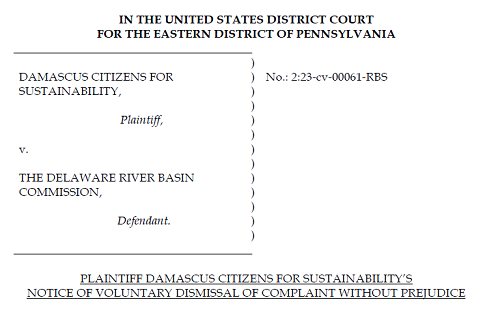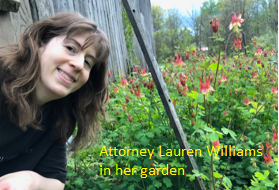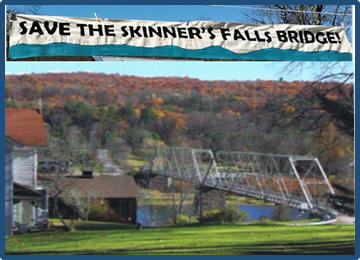
A Remarkable DCS Accomplishment Related to the Whole Delaware Basin
May 1, 2023
When We Need a Lawyer to Get the Job Done
May 14, 2023What’s in a name? How niggling about a definition kept poison out of your backyard.
Sharp eyes at DCS, and brilliant legal advocacy, get the DRBC to close a gaping loophole in their regulations, keeping toxic frack waste out of the Basin. Please support DCS in this work with a donation today.
Read more on our website, in chronological order, here, here and here.
DCS has for some years engaged me to write grant requests, press releases and the like, and in the course of this work, I have frequently had occasion to send a draft to Director Barbara Arrindell using the phrase “conventional wells.” Every time, I have received back an exclamation-point studded comment to the effect that I must clarify that “conventional” does not mean “not fracked”; on the contrary, over 95% of all wells are stimulated via High Volume Horizontal Hydrofracking (HVHF), whatever terms are used to refer to them. And this is particularly true in Pennsylvania, where “un-conventional” is taken specifically to refer only to oil and gas wells targeting the Marcellus formation—and there are many wells targeting other formations.
This has annoyed me because, as a writer, my job is to keep things short and concise enough that any reader can easily get to the end of them, without a lot of tangents explaining technical details that may not even be relevant to the issue at hand. I want a quick and dirty way to distinguish fracked from un-fracked wells, and I hate to have the word “conventional” taken away from me.
Well, sucks boo to me, because it is just this niggling about “conventional” that won DCS its recent victory in assuring that the DRBC’s finalized wastewater rules will keep toxic drilling waste from being spread on our local roads.
The DRBC, when it issued its finalized rules on oil and gas drilling wastewater last December, included this phrase in the accompanying FAQs: “…road spreading of wastewater from conventional drilling activities, an activity not within the scope of DRBC’s proposed rulemaking.”
Now, the person who wrote this, and the people who vetted it before it was published, were probably kind of like me. They needed a shorthand to get a point across, and so used the term “conventional,” either not knowing about the legal definition used in Pennsylvania or not wanting to be bothered by it.
But shorthand in law is lethal. At bottom, law is all about the exact meaning of words; that is what attorneys argue over in court.
The DRBC, in its motion to dismiss DCS’s legal challenge, is now saying that they all along agreed with DCS’s position about the definition of wastewater that should be banned from discharge to the Delaware River Valley. And we have no reason to disbelieve that that is what they meant, in their heads and hearts.
But that’s not what they said, which is what the law cares about. And what they said is what the fossil fuel companies’ lawyers could have taken to court—and won with.
Nor is the fact that this statement was made in FAQs, not the regulations themselves, material. When disputing the meaning of a word in courts, there are three places attorneys and judges can go: first, there is generally a list of definitions of terms at the beginning of legal documents. Second, if there are no such definitions, the standard of “plain English” can be used. And third, if the word is not defined within the document, but appears to be a term of art for which plain English does not provide adequate help, the court can look to context. That includes other documents surrounding the primary legal document in question that can give a clue as to the intent of the authors of the law or regulation.
Like FAQs.
“Conventional” wasn’t one of the terms defined in DRBC’s finalized rules. Nor can it, in the context of drilling, be understood in terms of plain English, given especially that PA statutes do specifically define it. If those FAQs had stayed the same, it was an invitation for the fossil fuel industry to start filling up tanks, bringing them on into the Delaware River Valley, and discharging the contents directly onto roads. And since, once fluid is inside a tank truck there’s no way to distinguish where it came from, there’s no telling but what some fracked well or Marcellus shale fluid wouldn’t get in there as well—but it’s all toxic, regardless. Remembering also, oil and gas industry exemptions mean there is no tracking or manifesting of the wastes.
And they could do so with confidence about any legal challenges, since their attorneys in court would be armed with the DRBC statement that it had no authority to regulate wastewater from conventional wells one way or another, along with the legal equation of “un-conventional” with “Marcellus” in PA.
But the FAQs didn’t stay the same. After the DCS challenge, DRBC changed the FAQs, and indeed, introduced a lengthy section explaining in great and specific detail the definition of waste whose discharge is prohibited: waste from anything, anywhere, anyhow, produced by HVHF stimulation, or even wastewater that consists in any part or proportion of such waste.
A precise definition. Exactly. Just what we will absolutely need in court should we need to challenge people trying to disobey the rule.
That’s why DCS filed for a “voluntary dismissal” of its own challenge: not because we agree with DRBC’s claim that it had said all along what needed to be said (regardless of what they thought or meant); but because they said something new, and different from what they said before, that closed a big loophole that their original verbiage had left gaping open.
They say they revised the facts to “eliminate confusion.” They imply the confusion was ours. It wasn’t. With due respect to their meanings and intentions, the confusion was in the sloppiness of their words.
In writing press releases, it’s hard to get across what a big victory this is, because I can’t write “DCS wins suit.” “DCS files for voluntary dismissal” is pretty weak sauce in comparison. And the DRBC is out there saying, “well, this is what we meant all along, so why the heck are they suing us?”
But it isn’t what they mean, it’s what they say that counts. And we made that right. Thanks to Barbara Arrindell niggling about a definition, and attorney Lauren Williams whipping it into brilliant legal form.
Remember that next time you walk down one of our country roads.




